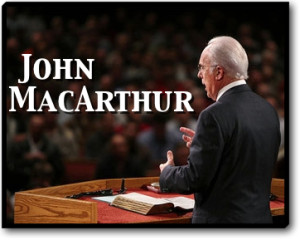Category Archives: The Will
Divine Sovereignty and Human Responsibility
 What Is the Relationship Between Divine Sovereignty and Human Responsibility?
What Is the Relationship Between Divine Sovereignty and Human Responsibility?
This excerpt is taken from None Other: Discovering the God of the Bible by John MacArthur.
The relationship between God’s sovereignty and human responsibility is not instantly obvious, and at first glance it seems paradoxical. But Scripture offers us considerable insight into how these twin truths harmonize within the plan of redemption.
The first step in understanding the compatibility between God’s sovereignty and human will is to recognize that they are not mutually exclusive, and Scripture makes this absolutely clear. In God’s design, human responsibility is clearly not eliminated by God’s sovereign control over His creation. That’s true even though evil was included in His grand design for the universe even before the beginning of time, and He uses His creatures’ sin for purposes that are always (and only) good. Indeed, in His infinite wisdom, He is able to use all things for good (Rom. 8:28).
Consider the Lord’s opening statement in Isaiah 10:5: “Woe to Assyria, the rod of My anger.” At first glance, this makes no sense. If Assyria is functioning as an instrument of God’s judgment, why is He pronouncing condemnation on the Assyrians? “Woe” is an onomatopoeic word (meaning the word sounds like what it means; in this case, a cry of agony) that warns of calamity or massive judgment to come. But how can a people come under divine denunciation and judgment while at the same time functioning as a rod of God’s anger? The rest of the verse says, “the staff in whose hand is My indignation.” Assyria, this pagan, godless, idolatrous nation, is the instrument of divine judgment against God’s own rebellious people.
In fact, the next verse says, “I send it against a godless nation [Judah, the southern part of the kingdom] and commission it against the people of My fury” (v. 6). The Jews are thus designated as the people of God’s fury. God holds Israel fully responsible for their disbelief; fully responsible for their idolatry; fully responsible for their rebellion and their rejection of Him, His Word, and His worship. So He commissions the Assyrians to come against them. Notice verse 6: “To capture booty, and to seize plunder, and to trample them down like mud in the streets.” That’s strong, decisive language.
Now here you have a divine decree in action. God grabs Assyria by the nape of its national neck and assigns it to be the instrument of His fury against the godless people of Judah who have rejected and rebelled against Him. And then He says in verse 7, “Yet it [Assyria] does not so intend, nor does it plan so in its heart.” Assyria is the instrument of God’s judgment—and the Assyrians themselves are clueless about it. It was never Assyria’s purpose, motive, or intention to serve God. They had no interest in the God of Scripture—they didn’t even believe in Him. Rather, Assyria planned in its own heart to cut off many nations. This was just another opportunity for the Assyrian power to knock off another neighboring nation, as they’d already done to Calno, Carchemish, Hamath, Arpad, Samaria, and Damascus (v. 9). Verses 10 and 11 depict Assyria’s confidence in its ability to conquer Judah: “As my hand has reached to the kingdom of the idols, whose graven images were greater than those of Jerusalem and Samaria, shall I not do to Jerusalem and her images just as I have done to Samaria and her idols?” All Assyria knows is that it has destroyed other nations who, in its judgment, had greater protection and greater gods than the God of the Bible. The Assyrians simply intended to do to Judah what they had done to the rest of the nations. They thought they were acting in complete independence. They had no idea that God was using them as agents to deliver His judgment.
But does being instruments of divine wrath somehow exonerate them from responsibility for the evil inherent in their military policies? If this irresistible divine decree brings them to Israel, what culpability do they have for their actions? And yet Scripture is clear that they will be held accountable. Verse 12 says that when God has finished using Assyria as an instrument of His fury, “So it will be that when the Lord has completed all His work on Mount Zion and on Jerusalem, He will say, ‘I will punish the fruit of the arrogant heart of the king of Assyria and the pomp of his haughtiness.’” The Lord has already decreed that once He is done using Assyria, He will punish it for its sins. The very act that the Assyrians carried out under divine decree was an act of evil—so evil that God will turn on them and bring destruction on them. In God’s eyes, they bear full culpability for every part of their evil slaughter and destruction, even though they are fulfilling His divine decree. Continue reading
The Will
Ian Hamilton is Pastor of Cambridge Presbyterian Church, now worshipping God on Sunday mornings in All Saints’ Church, Jesus Lane, Cambridge and in Resurrection Lutheran Church, Huntingdon Road, on Sunday evenings. He writes:
In 1524, Desiderius Erasmus, probably the foremost classical scholar in Europe, published a little book with the title Diatribe sue collatio de libero arbitrio (‘Discussion concerning free will’). Erasmus wrote the book to distance himself from the teachings of Martin Luther that were setting Europe ablaze and challenging the foundations of the papacy. Erasmus was in the semi-Pelagian tradition. He believed that salvation was a mutual cooperation between God and man; God did ‘almost everything’, but man had his part to play as well. Erasmus believed and taught that men and women were sinners, but he also taught that sin had not completely disabled us and left us utterly dead towards God. Sin was bad, even very bad, but it was not fatal.
 In 1525, Luther responded to Erasmus’ ‘little book’ with, what one writer called, ‘a bomb’. The title of Luther’s book says it all, De servo arbitrio,’The Bondage of the Will’.
In 1525, Luther responded to Erasmus’ ‘little book’ with, what one writer called, ‘a bomb’. The title of Luther’s book says it all, De servo arbitrio,’The Bondage of the Will’.
Luther thanked Erasmus for raising the issue of man’s will:
You alone . . . have attacked the real thing, that is, the essential issue. You have not worried me with those extraneous issues about the Papacy, purgatory, indulgences, and such like – trifles, rather than issues – in respect of which almost all to date have sought my blood . . . you, and you alone, have seen the hinge on which all turns, and aimed for the vital spot [literally, ‘taken me by the throat’]. For that I heartily thank you; for it is more gratifying for me to deal with this issue.1
For Luther, the issue of man’s will was not a matter of abstruse theology. The question of the freedom or bondage of the will takes us, Luther believed, to the heart of the doctrine of salvation and to the heart of the God-pleasing life. It is significant that Luther calls the issue ‘the hinge on which all turns’. Why? For one simple reason, if our wills are not totally in bondage, if there is any residue of essential goodness in any man or woman enabling them to will the good, then salvation is not ‘of the Lord’. Salvation becomes a cooperative act, God doing his part and man doing his. For Luther such thinking was both an affront to God and a denial of the gospel, and made the cross ‘of none effect’. The Bible could not be any clearer, salvation was wholly the work of God, the result of his grace to us in Christ. Even the faith we believe with is the gift of God (Eph.s 2:8). Luther rose to the challenge of responding to Erasmus, not because he was a cross-grained ex-monk, but because he was passionately jealous for the glory of God and the salvation of sinners.
Erasmus thought the issue of free will to be a subject for theologians to discuss and debate and for ordinary Christians to ignore as an idle speculation. For Luther nothing could be further from the truth. Clarity of understanding regarding the limits of the human will was, for Luther, essential to living a truly Christian life:
it is not irreligious, idle or superfluous, but in the highest degree wholesome and necessary, for a Christian to know whether or not his will has anything to do in matters pertaining to salvation.2
Luther saw the issue of the will to go to the very heart of the gospel and of the God-pleasing life:
Now, if I am ignorant of God’s works and power, I am ignorant of God himself; and if I do not know God, I cannot worship, praise, give thanks or serve Him, for I do not know how much I should attribute to myself and how much to Him. We need, therefore, to have in mind a clear-cut distinction between God’s power and ours, and God’s work and ours, if we would live a godly life.3
Far from being recondite and ‘superfluous’, to know the extent of our will’s bondage, or otherwise, could not be more crucial. If we have some virtuous capacity to will and to choose in our sinful natures, then self-confidence and self-righteousness are inescapable concomitants. But if our wills are wholly in bondage to sin and Satan, then salvation must wholly be of God and the glory completely his. God will have ‘no flesh’ to boast in his presence (1 Cor. 1:29).
Luther’s passionate defence of the biblical truth of the bondage of the will was not first motivated by a concern for doctrinal precision, though biblical doctrine is precise. What concerned Luther and motivated him to respond to Erasmus was his concern for God’s glory and the salvation of sinners. Where these two concerns animate a theologian, pastor, or ‘ordinary’ Christian, man’s total inability to will any good whatsoever will be asserted – not casually but passionately – and God’s grace in Christ magnified. Soli Deo Gloria.
Notes
J. I. Packer and O.R. Johnston, The Bondage of the Will, A New Translation of De Servo Arbitrio (London: James Clark, 1957), page 31.
Ibid., p. 78.
Ibid.
